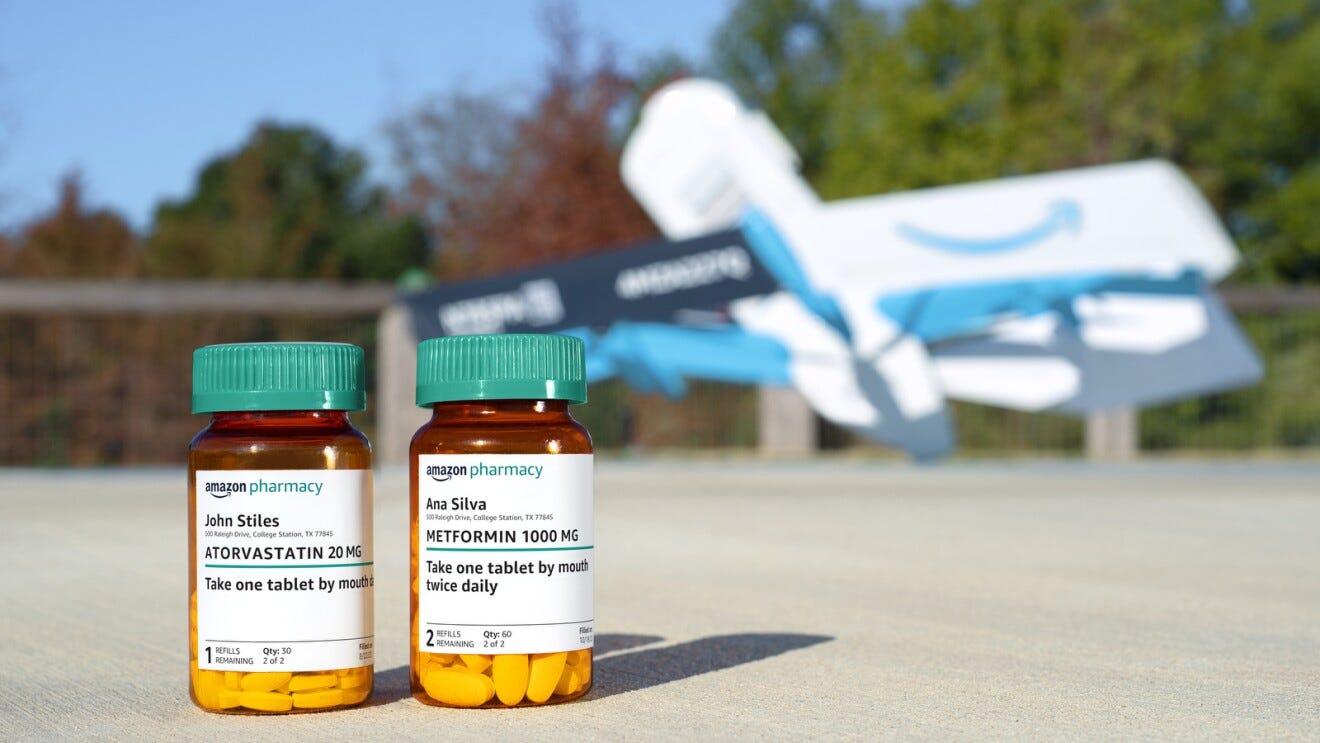How To Price Restaurant Tech?
Prime Air takes off, Robots hit USI & U-Akron, Doosan's mega IPO
How can restaurant tech providers justify their cost structures in the wake of Toast’s fee debacle? Does switching from third party to first party delivery save restaurants on commission or ultimately cost them customers? Which are the value added services that are worth their cost to restaurateurs and retailers? Join us Thursday at 10 AM Pacific for a lively webinar conversation on this important topic.
Speakers include Brian Hickey - Founder, VROMO; Gary Chaglasyan - CEO, RestoGPT; Emma Liem Beckett - Lead Editor, Restaurant Dive; and Robert Ananian - Owner, Stella's Pizza Kitchen. We’ll conclude the discussion with audience Q&A.
Amazon’s Drone Ambitions Take Off
Amazon is expanding its drone delivery service, Prime Air, to Italy, the UK, and a third undisclosed location in the U.S. by late 2024. The company's move into international territories builds on their existing U.S. drone delivery operations, which have been successfully delivering packages weighing up to five pounds in under an hour for almost a year. In tandem with this expansion, Prime Air has introduced a new drone model, the MK30, which boasts improved range, quieter operation, and versatility in diverse weather conditions. Beyond its technological advancements, Amazon is integrating drone deliveries into its existing fulfillment network, allowing for expedited delivery from both Same-Day Delivery sites and some fulfillment centers. The company's partnership with regulatory bodies ensures the safe and efficient rollout of this innovative delivery solution. Furthermore, the new MK30 drone can safely and autonomously detect and avoid obstacles, ensuring the safe delivery of items such as household products, beauty items, and tech supplies. Amazon also expanded its existing Prime Air service in College Station, Texas to include pharmaceutical deliveries.
Grocery Workforce Wary of Tech Tools
A recent report by Grocery Doppio revealed that while 87% of grocery store associates believe new technologies can enhance their performance, 63% have dealt with tech failures, impacting 81% of their job performances. Concerns arise as 73% attribute these failures to insufficient real-world testing and 87% fear AI and robotics might reduce the workforce. Additionally, a notable generational gap is observed, with 74% of Gen Z associates dissatisfied with current in-store tech, unlike the majority of Gen X and Boomer counterparts. Experts stress the need for user-centered tech designs and more associate input in tech deployment.
Grocery Delivery Spending Surges
Speaking of supermarkets, new data from McKinsey maps the continued rise of online grocery sales, as more consumers opt for delivery or parking lot pickup. But even as prices have climbed, grocers are facing continued downward pressure on margins, leading more to turn to labor saving automation and robotic delivery.
Delivery Bot Partnership Updates
Starship Robotics is rolling out at The University of Akron, in Ohio, courtesy of its partnership with Aramark; deliveries are placed via the Starship app. One state over, Kiwibot is headed to University of Southern Indiana, where 15 bots now roam the campus. Orders are placed via Grubhub, the partnership is through Sodexo. And up in the skies, sandwich chain Mendocino Farms announced it hopes to begin deploying Zipline drone deliveries in 2025.
Consumers Gaga for Ordering Tech
New data from PYMNTS shows that shoppers are eager to embrace technology, with 34% of respondents saying that they would be very or extremely interest in having their car or phone ask them if they would like to pick up coffee on their way to their destination, while 4.4% report already doing so. Consumers also showed an overwhelming interest in VR shopping, in-store smart mirrors, and more tie-ins between their phones and physical retailers / restaurants.
Doosan Robotics’ IPO Takes Off
Doosan Robotics, a South Korean firm renowned for creating robots that serve beer, make coffee, and deep-fry chicken, has recently debuted on the Seoul stock exchange, raising $312 million, marking South Korea’s largest IPO of the year. Shares surged, almost doubling from $19.29 to $38.13 on the first day, although the price has since cooled. Founded in 2015, Doosan, a pioneer in the collaborative robotics space, a competitive market given South Korea’s overall enthusiasm for robots. Last year, the company reported $33.3 million in revenue.
In Other News
The Atlantic declares “self-checkout is a failed experiment.” Researchers Ilan Mandel and Wendy Ju received an honorable mention at the Association for Computing Machinery conference on Designing Interactive Systems for their study on “garbatrage” — how to repurpose old electronics like hoverboards into new mechanical uses. Salted raises $14 million for its stable of health-forward virtual brands. Exploring DoorDash Kitchens’ Brooklyn operations. Don’t forget to join us Thursday for our conversation on delivery and restaurant tech pricing!




